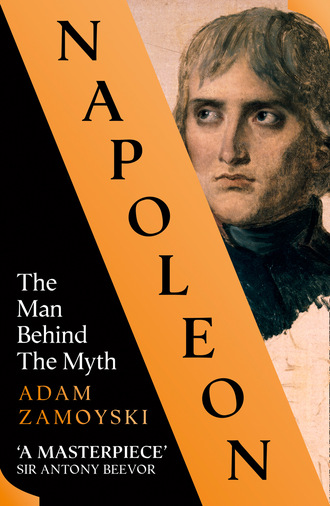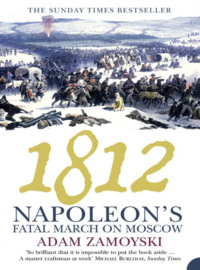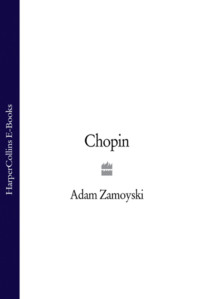
Полная версия
Napoleon
As the last echoes of the gun salute died away, the Directors emerged from a chamber in the depths of the palace, dressed in their ‘grand costume’. Designed by the painter Jacques-Louis David, this consisted of a blue velvet tunic heavily embroidered with gold thread and girded with a gold-tasselled white silk sash, white breeches and stockings, and shoes with blue bows. It was given a supposedly classical look by a voluminous red cloak with a white lace collar, a ‘Roman’ sword on a richly embroidered baldric, and a black felt hat adorned by a blue-white-red tricolour of three ostrich feathers.
The Directors took their place at the end of a cortège led by the commissioners of police, followed by magistrates, civil servants, the judiciary, teachers, members of the Institute of Arts and Sciences, officers, officials, the diplomatic representatives of foreign powers, and the ministers of the Directory. It was preceded by a band playing ‘the airs beloved of the French Republic’.4
The cortège snaked its way through the corridors of the palace and out into the courtyard, the various bodies taking their appointed seats. The members of the legislative chambers had already taken theirs. They wore costumes similar to that of the Directors, the ‘Roman’ look in their case sitting uneasily with their four-cornered caps, which were David’s homage to the heroes of the Polish revolution of 1794.
Having taken their seats, the Directors despatched an official to usher in the principal actors of the day’s festivities. The airs beloved of the French Republic had been superseded by a symphony performed by the orchestra of the Conservatoire, but this was rudely interrupted by shouts of ‘Vive Bonaparte!’, ‘Vive la Nation!’, ‘Vive le libérateur de l’Italie!’ and ‘Vive le pacificateur du continent!’ as a group of men entered the courtyard.
First came the ministers of war and foreign relations in their black ceremonial costumes. They were followed by a diminutive, gaunt figure in uniform, his lank hair dressed in the already unfashionable ‘dog’s ears’ flopping on either side of his face. His gauche movements ‘charmed every heart’, according to one onlooker. He was accompanied by three aides-de-camp, ‘all taller than him, but almost bowed by the respect they showed him’. There was a religious silence as the group entered the courtyard. Everyone present stood and uncovered themselves. Then the cheering broke out again. ‘The present elite of France applauded the victorious general, for he was the hope of everyone: republicans, royalists, all saw their present and future salvation in the support of his powerful arm.’ The dazzling military victories and diplomatic triumph he had achieved contrasted so strikingly with his puny stature, dishevelled appearance and unassuming manner that it was difficult not to believe he was inspired and guided by some higher power. The philosopher Wilhelm von Humboldt was so impressed when he saw him, he thought he was contemplating an ideal of modern humanity.5
When the group reached the foot of the altar of the fatherland, the orchestra and choir of the Conservatoire struck up a ‘Hymn to Liberty’ composed by François-Joseph Gossec to the tune of the Catholic Eucharistic hymn O Salutaris Hostia, and the crowd joined in an emotionally charged rendition of what the official account of the proceedings described as ‘this religious couplet’. The Directors and assembled dignitaries took their seats, with the exception of the general himself. ‘I saw him decline placing himself in the chair of state which had been prepared for him, and seem as if he wished to escape from the general bursts of applause,’ recalled the English lady, who was full of admiration for the ‘modesty in his demeanour’. He had in fact requested that the ceremony be cancelled when he heard what was in store. But there was no escape.6
The Republic’s minister for foreign relations, Charles-Maurice de Talleyrand, limped forward in his orthopaedic shoe, his ceremonial sword and the plumes in his hat performing curious motions as he went. The President of the Directory had chosen him rather than the minister of war to present the reluctant hero. ‘It is not the general, it is the peacemaker, and above all the citizen that you must single out to praise here,’ he had written to Talleyrand. ‘My colleagues are terrified, not without reason, of military glory.’ This was true.7
‘No government has ever been so universally despised,’ an informant in France had written to his masters in Vienna only a couple of weeks before, assuring them that the first general with the courage to raise the standard of revolt would have half of the nation behind him. Many in Paris, at both ends of the political spectrum, were expecting General Bonaparte to make such a move, and in the words of one observer, ‘everyone seemed to be watching each other’. According to another, there were many present who would happily have strangled him.8
The forty-three-year-old ex-aristocrat and former bishop Talleyrand knew all this. He was used to shrouding his feelings with an impassive countenance, but his upturned nose and thin lips, curling up on the left-hand side in a way suggesting wry amusement, were well fitted to the speech he now delivered.
‘Citizen Directors,’ he began, ‘I have the honour to present to the executive Directory citizen Bonaparte, who comes bearing the ratification of the treaty of peace concluded with the emperor.’ While reminding those present that the peace was only the crowning glory of ‘innumerable marvels’ on the battlefield, he reassured the shrinking general that he would not dwell on his military achievements, leaving that to posterity, secure in the knowledge that the hero himself viewed them not as his own, but as those of France and the Revolution. ‘Thus, all Frenchmen have been victorious through Bonaparte; thus his glory is the property of all; thus there is no republican who cannot claim his part of it.’ The general’s extraordinary talents, which Talleyrand briefly ran through, were, he admitted, innate to him, but they were also in large measure the fruit of his ‘insatiable love of the fatherland and of humanity’. But it was his modesty, the fact that he seemed to ‘apologise for his own glory’, his extraordinary taste for simplicity, worthy of the heroes of classical antiquity, his love of the abstract sciences, his literary passion for ‘that sublime Ossian’ and ‘his profound contempt for show, luxury, ostentation, those paltry ambitions of common souls’ that were so striking, indeed alarming: ‘Oh! far from fearing what some would call his ambition, I feel that we will one day have to beg him to give up the comforts of his studious retreat.’ The general’s countless civic virtues were almost a burden to him: ‘All France will be free: it may be that he will never be, that is his destiny.’9
When the minister had concluded, the victim of destiny presented the ratified copy of the peace treaty to the Directors, and then addressed the assembly ‘with a kind of feigned nonchalance, as though he were trying to intimate that he little liked the regime under which he was called to serve’, in the words of one observer. According to another, he spoke ‘like a man who knows his worth’.10
In a few clipped sentences, delivered in an atrocious foreign accent, he attributed his victories to the French nation, which through the Revolution had abolished eighteen centuries of bigotry and tyranny, had established representative government and roused the other two great nations of Europe, the Germans and Italians, enabling them to embrace the ‘spirit of liberty’. He concluded, somewhat bluntly, that the whole of Europe would be truly free and at peace ‘when the happiness of the French people will be based on the best organic laws’.11
The response of the Directory to this equivocal statement was delivered by its president, Paul François Barras, a forty-two-year-old minor nobleman from Provence with a fine figure and what one contemporary described as the swagger of a fencing-master. He began with the usual flowery glorification of ‘the sublime revolution of the French nation’ before moving on to vaporous praise of the ‘peacemaker of the continent’, whom he likened to Socrates and hailed as the liberator of the people of Italy. General Bonaparte had rivalled Caesar, but unlike other victorious generals, he was a man of peace: ‘at the first word of a proposal of peace, you halted your triumphant progress, you laid down the sword with which the fatherland had armed you, and preferred to take up the olive branch of peace!’ Bonaparte was living proof ‘that one can give up the pursuit of victory without relinquishing greatness’.12
The address meandered off into a diatribe against those ‘vile Carthaginians’ (the British) who were the last obstacle standing in the way of a general peace which the new Rome (France) was striving to bestow on the Continent. Barras concluded by exhorting the general, ‘the liberator to whom outraged humanity calls out with plaintive appeals’, to lead an army across the Channel, whose waters would be proud to carry him and his men: ‘As soon as the tricolour standard is unfurled on its bloodied shores, a unanimous cry of benediction will greet your presence; and, seeing the dawn of approaching happiness, that generous nation will hail you as liberators who come not to fight and enslave it, but to put an end to its sufferings.’13
Barras then stepped forward with extended arms and in the name of the French nation embraced the general in a ‘fraternal accolade’. The other Directors did likewise, followed by the ministers and other dignitaries, after which the general was allowed to step down from the altar of the fatherland and take his seat. The choir intoned a hymn to peace written for the occasion by the revolutionary bard Marie-Joseph Chénier, set to music by Étienne Méhul.
The minister for war, General Barthélémy Scherer, a forty-nine-year-old veteran of several campaigns, then presented to the Directory two of Bonaparte’s aides bearing a huge white standard on which the triumphs of the Army of Italy were embroidered in gold thread. These included: the capture of 150,000 prisoners, 170 flags and over a thousand pieces of artillery, as well as some fifty ships; the conclusion of a number of armistices and treaties with various Italian states; the liberation of the people of most of northern Italy; and the acquisition for France of masterpieces by Michelangelo, Guercino, Titian, Veronese, Correggio, Caracci, Raphael, Leonardo and other works of art. Scherer praised the soldiers of the Army of Italy and particularly their commander, who had ‘married the audacity of Achilles to the wisdom of Nestor’.14
The guns thundered as Barras received the standard from the hands of the two officers, and in another interminable address, he returned to his anti-British theme. ‘May the palace of St. James crumble! The Fatherland wishes it, humanity demands it, vengeance commands it.’ After the two warriors had received the ‘fraternal accolade’ of the Directors and ministers, the ceremony closed with a rendition of the rousing revolutionary war hymn Le Chant du Départ, following which the Directors exited as they had come, and Bonaparte left, cheered by the multitude gathered outside, greatly relieved that it was all over.15
For all his apparent nonchalance, he had been treading warily throughout. The Directory had not welcomed the coming of peace. The war had paid for its armies and bolstered its finances, while the victories had deflected criticism of its domestic shortcomings. More important, war kept the army occupied and ambitious generals away from Paris. This peace had been made by Bonaparte in total disregard of the Directory’s instructions, and it was no secret that the Directors had been furious when they were presented with the draft treaty. A few days after receiving it, they had nominated Bonaparte commander of the Army of England, not because they believed in the possibility of a successful invasion, but because they wanted him away from Paris and committed to a venture which would surely undermine his reputation. Their principal preoccupation now was to get him away from Paris, where he was a natural focus for their enemies.16
The day’s event had been a politically charged performance in which, as Bonaparte’s secretary put it, ‘everyone acted out as best they could this scene from a sentimental comedy’. But it was a dangerous one; according to one well-informed observer, ‘it was one of those occasions when one imprudent word, one gesture out of place can decide the future of a great man’. As Sandoz-Rollin pointed out, Paris could easily have become the general’s ‘tomb’.17
The hero of the day was well aware of this. The ceremony was followed by illuminations ‘worthy of the majesty of the people’ and a banquet given in his honour by the minister of the interior, in the course of which no fewer than twelve toasts were raised, each followed by a three-gun salute and an appropriate burst of song from the choir of the Conservatoire. Closely guarded by his aides, the general did not touch a morsel of food or drink a thing, for fear of being poisoned.18
It was not only the Directors who wished him ill. The royalists who longed for a return of Bourbon rule hated him as a ruthless defender of the Republic. The extreme revolutionaries, the Jacobins who had been ousted from power, feared he might be scheming to restore the monarchy. They denounced the treaty he had signed as ‘an abominable betrayal’ of the Republic’s values and referred to him as a ‘little Caesar’ about to stage a coup and seize power.19
Such thoughts were not far from the general’s mind. But he hid them as he assessed the possibilities, playing to perfection the part of a latter-day Cincinnatus. He refused the offer of the Directory to place a guard of honour outside his door, he avoided public events and kept a low profile, wearing civilian dress when he went out. ‘His behaviour continues to upset all the extravagant calculations and perfidious adulation of certain people,’ reported the Journal des hommes libres approvingly. Sandoz-Rollin assured his masters in Berlin that there was nothing which might lead one to suspect Bonaparte of meaning to take power. ‘The health of this general is weak, his chest is in a very poor state,’ he wrote, ‘his taste for literature and philosophy and his need of rest as well as to silence the envious will lead him to live a quiet life among friends …’20
One man was not fooled. For all his cynicism, Talleyrand was impressed, and sensed power. ‘What a man this Bonaparte,’ he had written to a friend a few weeks before. ‘He has not finished his twenty-eighth year: and he is crowned with all the glories. Those of war and those of peace, those of moderation, those of generosity. He has everything.’21
2
Insular Dreams
The man who had everything was born into a family of little consequence in one of the poorest places in Europe, the island of Corsica. It was also one of the most idiosyncratic, having never been an independent political unit and yet never been fully a province or colony of another state. It had always been a world of its own.
In the late Middle Ages the Republic of Genoa established bases at the anchorages of Bastia on the north-eastern coast and Ajaccio in the south-west to protect its shipping lanes and deny their use to others. It garrisoned these with soldiers, mostly impoverished nobles from the Italian mainland, and gradually extended its rule inland. But the mountainous interior held little economic interest, and although they penetrated it in order to put down insurgencies and exact what contributions they could, the Genoese found it impossible to control its feral denizens and largely left it alone, not even bothering to map it.
The indigenous population preserved its traditional ways, subsisting on a diet of chestnuts (from which even the local bread was made), cheese, onions, fruit and the occasional piece of goat or pork, washed down with local wine. They dressed in homespun brown cloth and spoke their own Italian patois. They were in constant conflict over issues such as grazing rights with the inhabitants of the port towns. These considered themselves superior and married amongst themselves or found spouses on the Italian mainland, yet with time they could not help being absorbed by the interior and its ways.
It was a pre-feudal society. The majority owned at least a scrap of land, and while a few families aspired to nobility, the differentials of wealth were narrow. Even the poorest families had a sense of pride, of their dignity and of the worth of their ‘house’. It was also a fundamentally pagan society, with Christianity spread thinly, if tenaciously, over a stew of ancient myths and atavisms. A profound belief in destiny overrode the Christian vision of salvation.
As there was hardly any coinage in circulation, most of the necessities of life were bartered. The result was a complicated web of favours granted and expected, of rights established or revindicated, agreements, often unspoken, and a plethora of litigation. Any violent move could provoke a vendetta from which it was almost impossible to escape, as nothing could be kept secret for long in such a restricted space. Shortage of land meant that ownership was divided and subdivided, traded and encumbered with complicated clauses governing rights of reversal. It was also the principal motive for marriage. And so it was for General Bonaparte’s father, Carlo Maria Buonaparte.
When his son came to power, genealogists, sycophants and fortune-hunters set about tracing his ancestry and came up with various pedigrees, linking him to Roman emperors, Guelf kings and even the Man in the Iron Mask. The only indisputable facts concerning his ancestry are that he was descended from a Gabriele Buonaparte who in the sixteenth century owned the grandest mansion in Ajaccio, consisting of two rooms and a kitchen over a shop and a store room, and a small garden with a mulberry tree.
Where Gabriele came from remains uncertain. The most convincing filiation is to minor gentry of the same name from the little town of Sarzana on the borders of Tuscany and Liguria, some of whom took service with the Genoese and were sent to Corsica. Recent DNA tests have shown that the Corsican Buonaparte belonged to the population group E, which is found mainly in North Africa, Sicily and particularly the Levant. This does not rule out a Ligurian connection, since people from those areas washed up over the ages on the coasts of Italy as well as those of Corsica.1
Gabriele’s son Geronimo had been notable enough to be sent as Ajaccio’s deputy to Genoa in 1572, and acquired, by marriage, a house in Ajaccio as well as a lease on some low-lying ground outside the town known as the Salines. His descendants also married well, within the circle of Ajaccio notables, but the need to provide dowries for daughters split up the family’s property, and Sebastiano Buonaparte, born in 1683, was reduced to marrying a girl from the upland village of Bocognano, apparently for the two small plots of land in the hills and the ninety sheep she brought him in her dowry. She bore him five children: one girl, Paola Maria, and four boys: Giuseppe Maria, Napoleone, Sebastiano and Luciano.
The family home had been partitioned by dowries, and the seven of them were crammed into the forty square metres that remained theirs. The building was so dilapidated that a military billeting commission classified it as unfit for any but lower ranks. Thus, although they were still considered among the anziani, the elders or notables of Ajaccio, the family’s lifestyle was anything but noble. A smallholding provided vegetables and their vineyards wine for their own needs and some extra to sell or exchange for oil and flour, while their flocks produced occasional meat for their own consumption and a little income.
Luciano was the most intelligent of the brood, and joined the priesthood. He bought out other family members and installed an indoor staircase in the house. His nephew, Giuseppe’s son Carlo Maria, born in 1746, also set about rebuilding the family fortunes, and it is his social ambitions that were to have such a profound effect on European history.2
History had begun to take an interest in Corsica. The corrupt inefficiency of Genoese rule had sparked off a rebellion on the island in 1729. It was put down by troops, but simmered on in the interior. In 1735 three ‘Generals of the Corsican nation’ convoked an assembly, the consulta, at Corte in the uplands and proclaimed independence, attracting the sympathies of many across Europe. One of the dominant themes in the literature of the Enlightenment was that of the noble savage, and Corsica seemed to fit the ideal of a society unspoilt by the supposedly corrupted Christian culture of Europe. In 1736 a German baron, Theodor von Neuhoff, landed in Corsica with weapons and aid for the rebels. He proclaimed himself King of the Corsicans and set about developing the island according to current ideals. Genoa called on France for military assistance, the rebels were obliged to flee, and Theodor settled in London, where he died, a declared bankrupt, in 1756. His vision did not die with him.3
In 1755 Pasquale Paoli, the son of one of the three ‘Generals of the Corsican nation’, had returned from exile in Naples and proclaimed a Corsican Republic. Born in 1725, Paoli had been eleven years old when Theodor expounded to him his vision for the island, and it had haunted him throughout his exile. Styling himself General of the Nation, over the next thirteen years he worked at building an ideal modern state endowed with a constitution, institutions and a university. His charisma ensured him the love of the majority of the Corsicans, who served him devotedly, referring to him as their Babbo, their father. He gained the admiration of enlightened European opinion, with Voltaire and Rousseau in the lead. The British traveller James Boswell visited him in 1765 and wrote up his experiences in what turned into a best-seller, further enhancing his reputation.4
While Paoli ruled the Corsican Nation from the Lilliputian hill-town of Corte at the heart of the island, coastal towns remained in the hands of the Genoese, who had twice called in French military assistance to maintain their grip. The French at first confined themselves to holding the port cities and surrounding areas, but it was unlikely that France would countenance the existence of a utopian republic on its doorstep for long, and wise Corsicans hedged their bets.
On 2 June 1764, a year after the death of his father, the eighteen-year-old Carlo Buonaparte married Letizia Ramolino, who was just under fifteen years of age. She was by all accounts a beauty, but that was not the motive for the match, which had been arranged by Carlo’s uncle Luciano. The Ramolino family, descended from a Lombard nobleman who had come to Corsica a couple of hundred years earlier, were of higher social standing than the Buonaparte. They were also better-connected and richer. Letizia’s dowry, which consisted of a house in Ajaccio and some rooms in another, a vineyard and about a dozen hectares of land, enhanced Carlo’s position. The marriage did not take place in church since the essence of any Corsican marital union was property, the principal element was the contract, and it was customary to sign this in the house of one of the parties, after which the newlyweds might or might not have their marriage blessed by a priest.5
Soon after their wedding, the couple moved to Corte, where Carlo’s uncle Napoleone had already joined Pasquale Paoli. Their first child was stillborn, their second, a daughter born in 1767, died in infancy. On 7 January 1768 they had a son, baptised Joseph Nabullion. Carlo enrolled at the university and eventually published a dissertation on natural rights which reveals a degree of education.6
Paoli resided in a massive structure made of the same dark-grey rock as all the other houses and the paving of the streets in Corte. He imported furniture and textiles from Italy in order to create within this grim building a few rooms in which a head of government could receive. Good-looking and amiable, the young Carlo quickly won his friendship. Letizia was by Corte standards a sophisticated and well-dressed lady, and her beauty and strong personality meant that along with her sister Geltruda Paravicini she was a welcome member of Paoli’s entourage.







